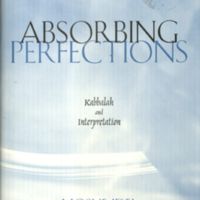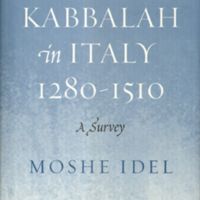Absorbing Perfections: Kabbalah and Interpretation
Dublin Core
Title
Absorbing Perfections: Kabbalah and Interpretation
Description
"In this wide-ranging discussion of Kabbalah - from the mystical trends of medieval Judaism to modern Hasidism - one of the world's foremost scholars considers different visions of the nature of the sacred text and the methods used to interpret it. Moshe Idel takes as a starting point the fact that the postbiblical Jewish world lost its geographical center with the destruction of the Temple and so was left with a textual center, the Holy Book. Idel argues that a text-oriented religion produced language-centered forms of mysticism."--Jacket.
In this wide-ranging discussion of Kabbalah - from the mystical trends of mediaeval Judaism to modern Hasidism - this book considers different visions of the nature of the sacred text and of the methods to interpret it. It takes as a starting point the fact that the post-biblical Jewish world lost its geographical centre with the destruction of the temple and so was left with a textual centre, the Holy Book. The author argues that a text-oriented religion produced language-centred forms of mysticism. Against this background, he demonstrates how various Jewish mystics amplified the content of the Scriptures so as to include everything: the world, or God, for example.
In this wide-ranging discussion of Kabbalah - from the mystical trends of mediaeval Judaism to modern Hasidism - this book considers different visions of the nature of the sacred text and of the methods to interpret it. It takes as a starting point the fact that the post-biblical Jewish world lost its geographical centre with the destruction of the temple and so was left with a textual centre, the Holy Book. The author argues that a text-oriented religion produced language-centred forms of mysticism. Against this background, he demonstrates how various Jewish mystics amplified the content of the Scriptures so as to include everything: the world, or God, for example.
Creator
Moshe Idel
Contributor
Foreword by Harold Bloom
Table Of Contents
The world-absorbing text -- The God-absorbing text : black fire on white fire -- Text and interpretation infinities in Kabbalah -- The book that contains and maintains all -- Magical and magical-mystical arcanizations of canonical books -- Torah study and mystical experiences in Jewish mysticism -- Secrecy, binah, and derishah -- Semantics, constellation, and interpretation -- Radical forms of Jewish hermeneutics -- The symbolic mode of theosophical-theurgical Kabbalah -- Allegories, divine names, and experiences in ecstatic Kabbalah -- Tzerufei otiyyot : mutability and accommodation of the Torah in Jewish mysticism -- Tradition, transmission, and techniques -- Concluding remarks -- Appendix 1. Pardes : the fourfold method of interpretation -- Appendix 2. Abraham Abulafia's Torah of blood and ink -- Appendix 3. R. Isaac of Acre's exegetical quandary -- Appendix 4. The exile of the Torah and the imprisonment of secrets -- Appendix 5. On oral Torah and multiple interpretations in Hasidism -- Appendix 6. "Book of God"/"book of law" in late-fifteenth-century Florence.
The world-absorbing text -- The God-absorbing text : black fire on white fire -- Text and interpretation affinities in Kabbalah -- The book that contains and maintains all -- Magical and magical-mystical arcanizations of canonical books -- Torah study and mystical experiences in Jewish mysticism -- Secrecy, binah, and derishah -- Semantics, constellation, and interpretation -- Radical forms of Jewish hermeneutics -- The symbolic mode of theosophical-theurgical Kabbalah -- Allegories, divine names, and experiences in ecstatic Kabbalah -- Tzerufei otiyyot : mutability and accommodation of the Torah in Jewish mysticism -- Tradition, transmission, and techniques -- Concluding remarks -- Appendix 1. Pardes : the fourfold method of interpretation -- Appendix 2. Abraham Abulafia's Torah of blood and ink -- Appendix 3. R. Isaac of Acre's exegetical quandary -- Appendix 4. The exile of the Torah and the imprisonment of secrets -- Appendix 5. On oral Torah and multiple interpretations in Hasidism -- Appendix 6. "Book of God"/"book of law" in late-fifteenth-century Florence.
The world-absorbing text -- The God-absorbing text : black fire on white fire -- Text and interpretation affinities in Kabbalah -- The book that contains and maintains all -- Magical and magical-mystical arcanizations of canonical books -- Torah study and mystical experiences in Jewish mysticism -- Secrecy, binah, and derishah -- Semantics, constellation, and interpretation -- Radical forms of Jewish hermeneutics -- The symbolic mode of theosophical-theurgical Kabbalah -- Allegories, divine names, and experiences in ecstatic Kabbalah -- Tzerufei otiyyot : mutability and accommodation of the Torah in Jewish mysticism -- Tradition, transmission, and techniques -- Concluding remarks -- Appendix 1. Pardes : the fourfold method of interpretation -- Appendix 2. Abraham Abulafia's Torah of blood and ink -- Appendix 3. R. Isaac of Acre's exegetical quandary -- Appendix 4. The exile of the Torah and the imprisonment of secrets -- Appendix 5. On oral Torah and multiple interpretations in Hasidism -- Appendix 6. "Book of God"/"book of law" in late-fifteenth-century Florence.
Text Item Type Metadata
Original Format
Book
Citation
Moshe Idel, “Absorbing Perfections: Kabbalah and Interpretation,” Humanities Hub, accessed February 26, 2026, https://humanitieshub.sdsu.edu/omeka/items/show/1407.


